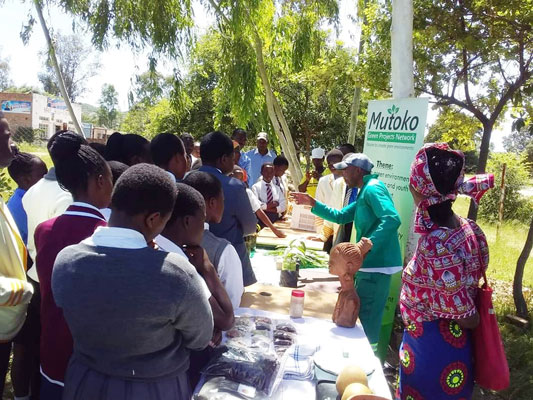
community builders:with Takemore Mazuruse
There is something magical and healing about the countryside. Life is so real and the environment allows you to reconnect with your inner self. It is, therefore, no coincidence that even the haves of this world want to retire to the countryside for a deserved break from the hustle and bustle of the city.
However, the truth is that it’s not all rosy for the average village dweller and life can be so difficult that unshackling yourself from the rural life limitations can remain a pipe dream unless and until one makes a personal decision to fight the status quo.
For Solomon Mutasa, a Mutoko rural-based social entrepreneur, journalist and community builder, life in the countryside is ideal and a lot can be achieved there, but he remains alive to the various challenges that such communities encounter on a daily basis, hence his ambitious Mutoko Green Project.
“I was born and bred in Mutoko district, 150km north-east of Harare in Mashonaland East province. Mutoko is a small to medium-scale farming district, but for all its massive tomato production, locals have not realised much from their ventures,” Mutasa said.
“For my education, I went through Mutoko High School and Vainona High School corridors before earning a Diploma in Journalism and Media Studies at UMAA Institute in Harare. I then worked as a sports reporter at leading media houses like NewsDay, The Herald and The Sunday Mail before moving to South Africa where I practiced community journalism for four years.”
For someone who would wake up to work in the fields before going to school and relying on unprotected water sources during his entire childhood, life was a nightmare and he is grateful for his strides to date and hopes to give back to his community through time-relevant agricultural innovation.
“Every morning we had to work on the fields before going to school and again back in the fields after school for our own food security,” he said.
- Chamisa under fire over US$120K donation
- Mavhunga puts DeMbare into Chibuku quarterfinals
- Pension funds bet on Cabora Bassa oilfields
- Councils defy govt fire tender directive
Keep Reading
“Our greatest fear growing up was food insecurity and malaria. We would draw water from open water sources like dams using an ox-drawn scotch-cart and the community generally relied on poor agricultural practices.”
Mutasa, whose journey of life has seen him being shortlisted for various life-changing youth development programmes, has received enough inspiration to champion community development and he believes his Mutoko Green Project will bring a lot of positive change to the community.
“I have attended training that has enhanced my scope on empowering the marginalised rural communities. I participated in the Young African Leaders Initiative Southern Africa region (Yali-RLC-SA) curriculum on Entrepreneurship and Business Leadership at the University of South Africa (Unisa), which inspired me to start a movement called the Mutoko Green Project,” he said.
“When I returned home I noticed some missing links towards making communal farming and horticulture in Mutoko a viable source of income.”
Through the Mutoko Green Project, Mutasa has become a social entrepreneur who empowers rural communities through smart agricultural practices for food security towards alleviation of poverty.
“Mutoko is one of the biggest producers of tomatoes in the country since time immemorial, but there is nothing to show for the small-scale farmers’ efforts,” he said.
“I identified the problems and came up with a solution to plug the linkages.
“I have since introduced organic gardening as the main activity of Mutoko Green Project by grouping rural women and youths.”
Besides hands-on training in the garden, Mutoko Green Project also facilitates workshops for knowledge exchange and partnerships with communities in similar work.
“Since 2017, we have grown to not only practice organic gardening, but also organic aquaculture and agri-tourism. It’s about giving someone in the village a chance to learn and develop his or her skills,” he said.
Mutasa, a 2019 Mandela Washington fellow, Yali Southern Africa regional coordinator in Zimbabwe, UNLEASH Innovation Lab Alumni and part of the United Nations Vision 2030 Agenda since 2017, has also been invited to make presentantions at global conferences in Copenhagen, Frankfurt (2017) and Shenzhen (2019). He believes all these experiences have shaped his thinking on community development.
“I have been part of various global initiatives and conferences which have all shaped my approach to community development, but the biggest challenge is the socio-political environment that we operate in,” he said.
“My vision for a food-secure Zimbabwe encompasses a youth-driven agriculture system. Africa has the youngest population in the world and that will double by 2050. The future is bleak if we don’t invest and encourage youths to be part of the value chain.”
Mutasa said it was important to inspire youths to take agriculture as a career option, give them more land and set up decentralised agricultural hubs for innovation across the country.
Mutasa also shared his thoughts on the Covid-19 global pandemic and called for proper empowerment of youths to mitigate such eventualities.
“Covid-19 has impacted the whole world and the solution to prepare for such eventualities comes down to the youths,” he said..
“We have invested a great deal in technology, it’s about time businesses and governments invested in young technocrats be it in health, agriculture or even responsible consumption.
“Economies must also invest in online-based businesses and make it viable.”
He boasts of an annual online tutorial publication called OrgaNicer that scholars, academics and other relevant groups can check and learn from the organisation’s experiences. He is also writing a book titled Tears of The African Dream to inspire youths.











